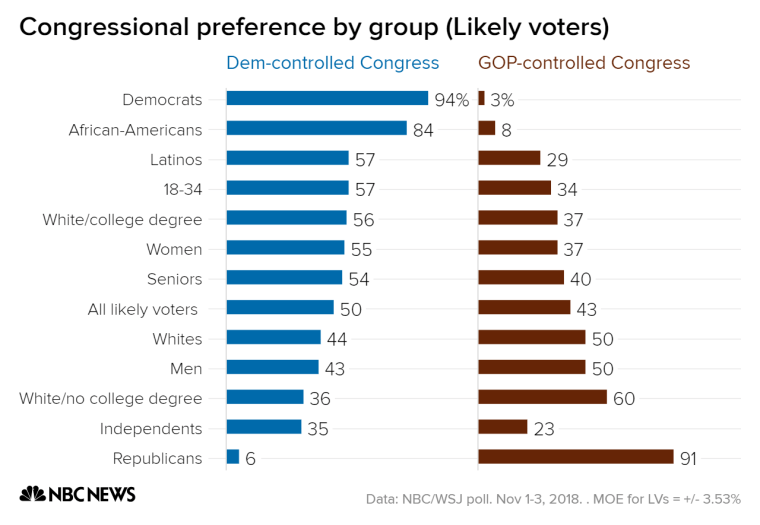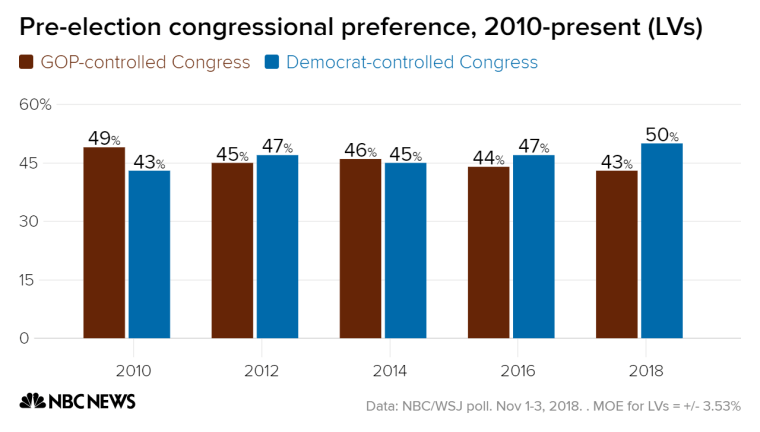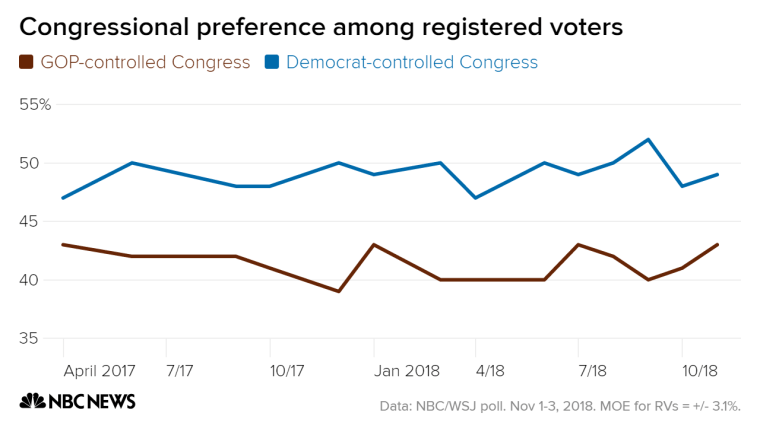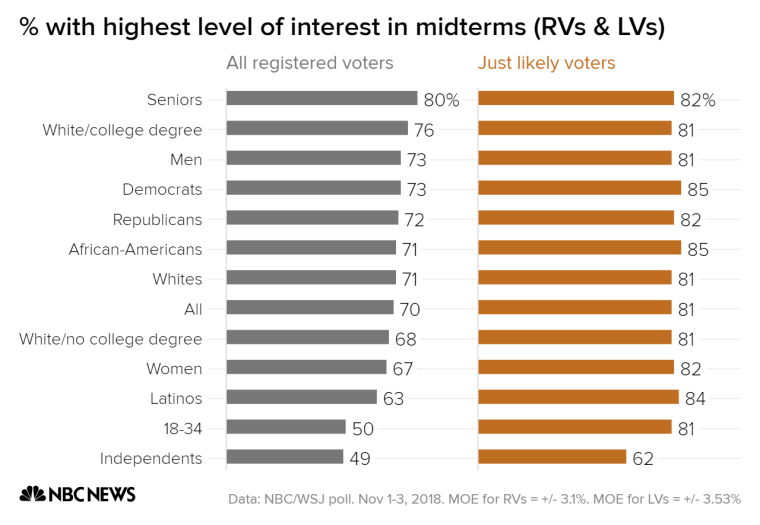WASHINGTON — Democrats hold a 7-point advantage over Republicans in the final national NBC News/Wall Street Journal poll before Tuesday’s midterm elections, with both parties showing record enthusiasm and interest in the upcoming contests.
Fifty percent of likely voters say they prefer a Democratic-controlled Congress, while 43 percent want Republicans in charge. That’s down from Democrats’ 9-point advantagein October’s NBC/WSJ poll, though the change is well within the poll’s margin of error.
(Among the wider pool of registered voters, Democrats lead Republicans by 6 points, 49 percent to 43 percent.)

Democrats lead with likely African-American voters (84 percent to 8 percent), Latinos (57 percent to 29 percent), voters ages 18-34 (57 percent to 34 percent), women (55 percent to 37 percent) and independents (35 percent to 23 percent).
Among white women with college degrees, the Democratic edge is 28 points, 61 percent to 33 percent.
Republicans, meanwhile, are ahead among voters ages 50-64 (52 percent to 43 percent), men (50 percent to 43 percent) and whites (50 percent to 44 percent).
Among white women without college degrees, Republicans have a 12-point advantage, 54 percent to 42 percent. And among white men without college degrees, it’s 35 points, 65 percent to 30 percent.

“It is a political kaleidoscope,” says Democratic pollster Peter Hart, whose firm conducted this survey with Republican pollster Bill McInturff. “You turn the poll one way, and it looks [good for Democrats].”
But you turn it another way, Hart adds, “you can see how the GOP squeaks through.”

“It has closed. It is a more competitive race,” says McInturff, the Republican pollster. “But for Republicans, it feels slightly short of where you’d want to be for a national election.”
Record enthusiasm for the midterms
Both Democratic and Republican voters are expressing a record-level of enthusiasm heading into Tuesday’s elections. Eighty-five percent of likely Democratic voters have a high level of interest in the midterms — registering either a “nine” or “10” on a 10-point scale — versus 82 percent for Republicans.
Among all registered voters, 70 percent are highly interested in the election, which is up from 61 percent in 2006 and 2010.

For additional perspective, back in October 2016 — a presidential election — 72 percent of registered voters said they were very interested in the election, according to that NBC/WSJ poll two years ago.
“There have never been midterm numbers that look like this,” says McInturff.
Trump’s job rating remains stable
Trump’s job rating among likely voters is 46 percent approve, 52 percent disapprove – essentially unchanged from October’s 45 percent approve, 52 percent disapprove.
(Among registered voters, it’s an equal 46 percent approve, 52 percent disapprove.)
Only 37 percent of registered voters approve of Trump’s handling of the recent shooting at a Pittsburgh synagogue, and just 39 percent back his handling of the pipe bombs sent to prominent Democrats.
But only 22 percent of voters said these events had a significant impact on their vote, versus 75 percent who said they had no significant impact.
A plurality of registered voters — 40 percent — say their vote will be a signal of opposition to Trump, compared with 32 percent who say it will be a signal of support; 28 percent say it will not be a signal either way.
Forty-one percent say their vote will be a message for more Democrats to check and balance Trump and congressional Republicans, versus 31 percent who say it will be a message for more Republicans to help Trump and the GOP pass their agenda.
Asked differently, however, 43 percent of voters say they are more concerned Republicans will go too far in supporting Trump, while an equal 43 percent say they are more concerned that the Dems will go too far in obstructing the president.
Nearly 60 percent desire change, despite a strong economy
But 59 percent of registered voters say they want a “great deal” or “quite a bit” of change in direction from the way President Donald Trump has been leading the country, versus a combined 38 percent who want no change, not that much change or just some change.
Those numbers are virtually identical to our September poll — and are close to what the NBC/WSJ poll found from 1994 (when Democrats lost control of Congress) and 2010 (when they lost the House).
“This will be an election that, like most first midterms of a new president, fundamentally is a referendum on President Trump,” says Democratic pollster Fred Yang of Hart Research Associates.
The nearly six-in-10 voters desiring change is in sharp contrast with the 68 percent who say they’re “very” or “somewhat” satisfied with the state of the economy, and the 74 percent who are satisfied with their own financial situation.
“If the GOP fails to hold the House, the president will only have himself to blame” — given the state of the economy, says Hart, the Democratic pollster.
The NBC/WSJ poll was conducted Nov. 1-3 of 1,000 registered voters — about half by cellphone, half by landline — and it has an overall margin of error of plus-minus 3.1 percentage points. Among the 774 likely voters surveyed, the margin of error is plus-minus 3.5 percentage points.
